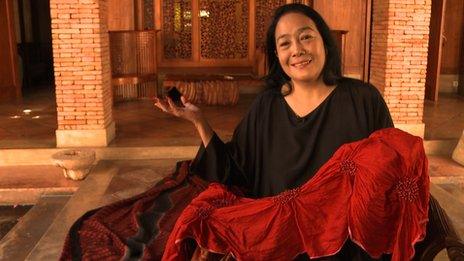Indonesian entrepreneur who made batik chic
- Published

Walk into any fancy soiree in Jakarta and you are as likely to find an Obin batik shawl as an Hermes handbag.
The former may not be familiar to those outside Indonesia but if anyone could change that, it is the shawl's cloth maker, Josephine Komara, better known as Obin.
The 57-year-old is widely credited with transforming batik from the compulsory outfit of politicians' wives at state functions into the fashion choice of trendy professionals at cocktail parties.
Batik is a traditional Indonesian method of decorating fabric using wax to create patterns on cloth that is dyed.
Obin started collecting Indonesian antique textiles in her teens. In 1986 she opened Bin House, now a renowned fashion house in the capital Jakarta's upscale Menteng neighbourhood.
"The shop encroaches into my home, that is why it's called Bin House," she said.
"The first shop existed when the first person who came in to my house said: 'I would like to buy a piece of cloth'. Then it became a shop."
Her first customers were her interior designer and decorator friends who were looking for curtains, upholstery and pillowcases.
The cloths only became wearable after hand-weaving and hand-spinning techniques were perfected over several years, she said.
Today hand-woven sarongs and shawls of her custom-made batik are worn by Indonesia's rich and famous, with some pieces costing $1,000 (£621).
Bin House employs more than 1,000 artisans and its shops can be found in Bali, Japan and Singapore.
Josephine Komara showed BBC News some of the skills that have been passed down by generations of Javanese women.
Obin plans to open a museum to display her textile collection in Bali in 2013.
She is best known for pioneering the application of batik designs onto hand-woven silk fabrics.
'Production' vs 'creation'
But as batik has grown in popularity, so has the supply of mass-produced, largely affordable textiles with similar motifs passed off as the real thing.
"That is called production," Obin says of the industry. "[What we do] is called creation. Every breath you take when you wax, if you're [anxious], your strokes will be very hasty."
The delicate process means some pieces with ornate designs take up to 18 months to finish, which explains the hefty price tag.
But Obin insists her focus is not on revenue.
She says that her pieces require so much time and energy that more than becoming works of art, they become works of life. They also generate income for those who create them.
In her workshop just outside Solo in Central Java, there are more than 100 artisans who spin, weave, draw, wax and dye using only their hands and traditional instruments.
Nilam Sari, 30, has been working there for seven years. Her mother, seated next to her, has been working there for 18 years.
Nilam has a 10-year-old daughter who she hopes would become a batik artisan too.
Obin believes that the attachment of Javanese people to making batik is key to the survival of her creation. But expanding the market is another challenge.
Berlin-born Peter Mayer, who now lives in Jakarta, is one of Bin House's most loyal customers.
He said European, Australian and American trader friends who buy Bin's pieces and sell them back home find compared to similar products from Thailand or Vietnam they are the most sought-after pieces.
But transforming Bin House into a global brand is difficult because of its handmade pieces.
"It's hard to break into a market because it would be extremely cost-intensive," he said.
"Another issue is if somebody sees a beautiful piece in the window and wants exactly the same one, it is probably not possible to replicate."
But that does not worry Obin, as long as traditional weaving and batik techniques continue to be passed on to the next generation.
"This should be maintained. This should never be gone," she says.